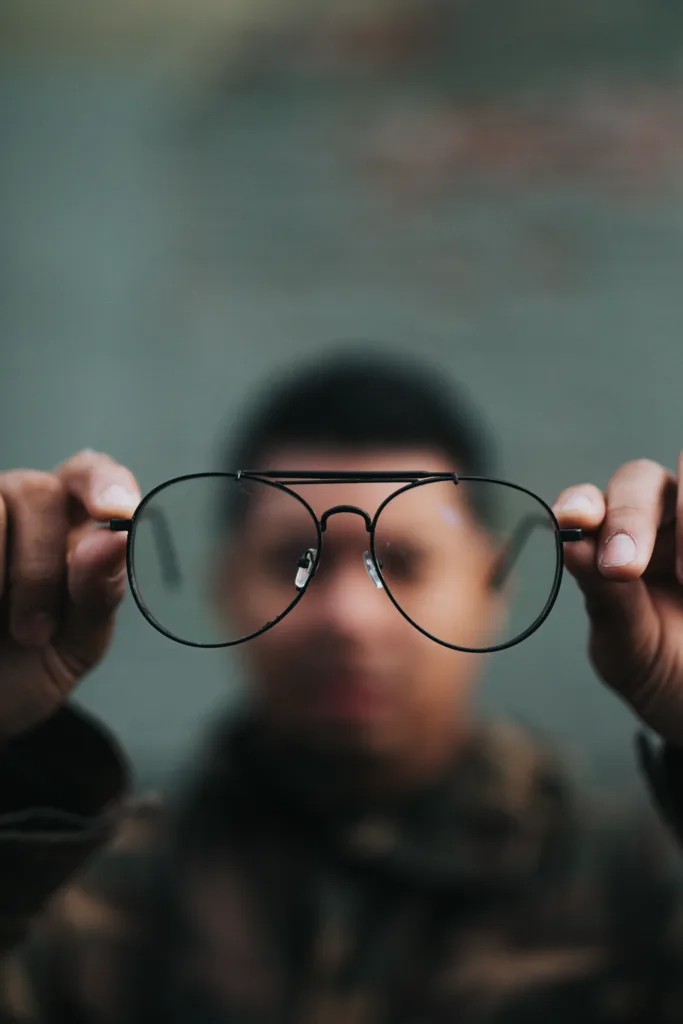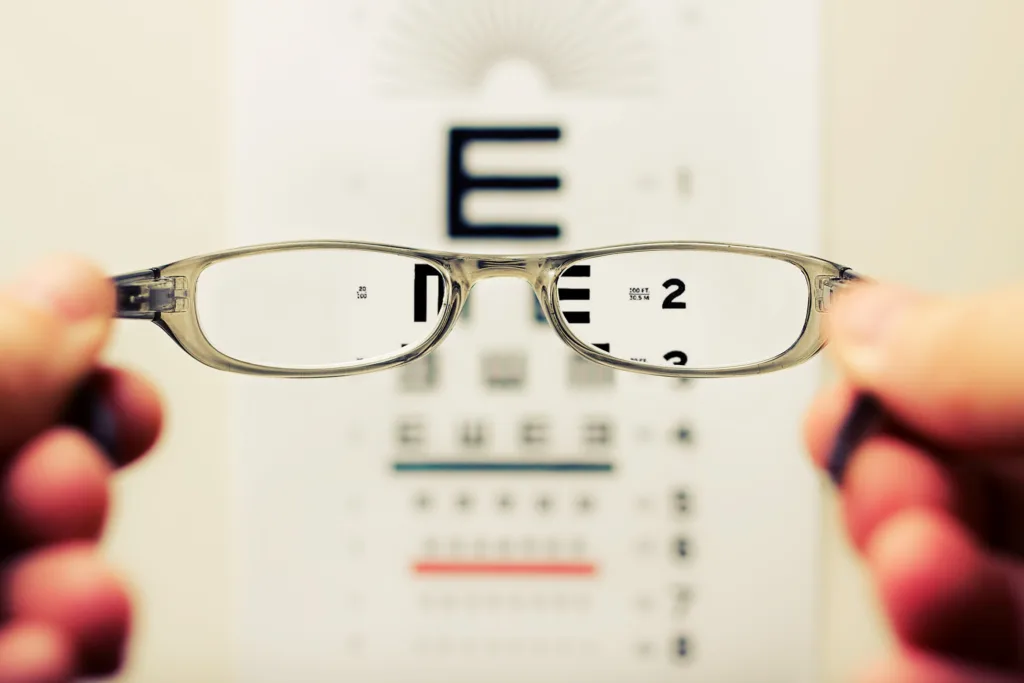Dimness of vision is a common problem that affects people of all ages. It can be caused by a variety of factors, ranging from refractive errors to more serious underlying conditions. In this blog post, we’ll explore the caues of dimness of vision, how it can be treated, and what you can do to prevent it.
Refractive Errors
One of the most common causes of dimness of vision is refractive errors, such as nearsightedness, farsightedness, and astigmatism. These conditions occur when the shape of the eye prevents light from being focused correctly on the retina, resulting in blurry or dim vision. Fortunately, refractive errors can be easily corrected with glasses, contact lenses, or refractive surgery.
Incorrect Prescription
If you’re experiencing dimness of vision despite wearing corrective lenses, it’s possible that your prescription is incorrect. This can happen if your eyes have changed over time, or if your optometrist made a mistake when prescribing your lenses. If you suspect that your prescription is incorrect, schedule an appointment with your eye doctor as soon as possible.
Age-Related Vision Changes
As we age, our eyes naturally undergo changes that can lead to dimness of vision. Presbyopia, for example, is a common condition that affects people over the age of 40. It occurs when the lens of the eye becomes less flexible, making it harder to focus on close objects. Age-related macular degeneration (AMD) is another condition that can cause dimness of vision. It occurs when the macula, the part of the retina responsible for sharp, central vision, deteriorates over time.
Underlying Conditions
In some cases, dimness of vision can be a symptom of a more serious underlying condition. Glaucoma, for example, is a group of eye diseases that can cause damage to the optic nerve and lead to vision loss. Diabetes, on the other hand, can damage the blood vessels in the retina, leading to a condition known as diabetic retinopathy. If you’re experiencing dimness of vision, it’s important to schedule an appointment with your eye doctor to rule out any underlying conditions.
Treatment and Prevention
The treatment for dimness of vision will depend on the underlying cause. If your vision is dim due to a refractive error, your optometrist can prescribe corrective lenses to help you see more clearly. If you have an underlying condition, such as glaucoma or diabetic retinopathy, your treatment will focus on managing the condition to prevent further vision loss.
To prevent dimness of vision, it’s important to have regular eye exams. Your eye doctor can detect early signs of conditions like glaucoma and macular degeneration, allowing for early treatment and prevention of vision loss. Additionally, protecting your eyes from UV radiation and eating a healthy diet rich in vitamins and minerals can help keep your eyes healthy and prevent vision problems.
In conclusion, dimness of vision can be caused by a variety of factors, ranging from refractive errors to underlying conditions. If you’re experiencing dimness of vision, it’s important to schedule an appointment with your eye doctor to determine the underlying cause and receive appropriate treatment. And remember, regular eye exams and healthy lifestyle habits can help prevent vision problems and keep your eyes healthy for years to come.
Causes of Dim Vision
Dim vision can be caused by a variety of factors, including age-related changes in the eye, certain medical conditions, and injuries to the eye or brain. One of the most common causes of dim vision is cataracts, which occur when the lens of the eye becomes cloudy and obstructs light from entering the eye. Other common causes include macular degeneration, glaucoma, and diabetic retinopathy, all of which can damage the retina and impair vision. Other medical conditions that can cause dim vision include multiple sclerosis, stroke, and brain tumors. In some cases, medications such as antihistamines or antidepressants can also cause vision changes. If you are experiencing dim vision, it is important to consult with an eye doctor to determine the underlying cause and receive approriate treatment.

Source: verywellhealth.com
Can Dim Vision Be Cured?
Dim vision can be cured depending on the underlying cause. If the cause of dim vision is due to cataracts, surgery can be performed to remove the cloudy lens and replace it with an artificial one. If the cause of dim vision is due to age-related macular degeneration, treatments such as injections or laser therapy may be used to slow down the progression of the disease. In cases where the cause of dim vision is due to glaucoma, eye drops, oral medication, or surgery may be recommended to lower eye pressure and prevent furthr damage to the optic nerve. Therefore, the treatment options for dim vision vary depending on the underlying cause, and it is crucial to consult an eye doctor for a proper diagnosis and treatment plan.
Causes of Dim Vision in One Eye
Dim vision in one eye can be caused by varous underlying conditions. One of the most common causes is refractive errors such as nearsightedness, farsightedness, and astigmatism. These conditions occur when the shape of the eye prevents light from focusing correctly on the retina, causing blurry or distorted vision.
Another potential cause of dim vision in one eye is an incorrect prescription for glasses or contact lenses. It is important to have regular eye exams to ensure that your prescription is up to date and accurate.
Age-related vision changes can also lead to dim vision in one eye. As we age, our eyes undergo natural changes that can affect our vision. Presbyopia is a common age-related condition that can cause difficulty seeing up close. Age-related macular degeneration (AMD) is another condition that can cause dim vision in one eye. This condition occurs when the macula, which is responsible for central vision, deteriorates over time.
Other possible causes of dim vision in one eye include cataracts, glaucoma, and retinal detachment. It is essential to consult an eye doctor if you experience any changes in your vision, as prompt treatment can be crucial in preventing further vision loss.
Effects of Poor Vision in Dim Light
Poor vision in dim light can be caused by several factors. One of the most common causes is a condition called night blindness, also kown as nyctalopia. This condition usually occurs due to a lack of vitamin A, which is essential for the proper functioning of the retina. The retina is the part of the eye that is responsible for detecting light and converting it into electrical signals that are sent to the brain, allowing us to see.
Another common cause of poor vision in dim light is age-related macular degeneration (AMD). This condition occurs when the macula, the part of the retina responsible for central vision, deteriorates over time, resulting in a loss of vision in the center of the visual field. This can make it difficult to see in low light conditions, as the macula is responsible for detecting light and color.
Other factors that can contribute to poor vision in dim light include cataracts, a clouding of the eye’s natural lens that can cause blurry vision, and glaucoma, a group of eye conditions that damage the optic nerve and can lead to vision loss. Dry eye syndrome, which occurs when the eyes do not produce enough tears or produce tears that are of poor quality, can also cause poor vision in dim light.
In summary, poor vision in dim light can be caused by a variety of factors, including night blindness, age-related macular degeneration, cataracts, glaucoma, and dry eye syndrome. If you are experiencing difficulty seeing in low light conditions, it is important to see an eye doctor for a comprehensive eye exam to determine the cause of your vision problems and receive appropriate treatment.
The Effects of Stress on Vision
Yes, stress can cause dim vision. When you are stressed, your body releases a hormone called cortisol, which can cause chages in the body, including in the eyes. Cortisol can cause the blood vessels in the eyes to constrict, which reduces the amount of oxygen and nutrients that reach the eyes. This can lead to blurry or dim vision. Additionally, stress can cause tension in the muscles around the eyes, which can also contribute to dim vision. If you are experiencing dim vision due to stress, it is important to take steps to reduce your stress levels, such as practicing relaxation techniques, getting enough sleep, and exercising regularly. It is also a good idea to see an eye doctor to rule out any underlying medical conditions that may be contributing to your vision problems.

The Effects of Dehydration on Vision
Yes, dehydration can cause dim vision. Dehydration occurs when the body loses more fluids than it takes in, whch can lead to a decrease in blood volume and a reduction in the amount of oxygen and nutrients that reach the eyes. This can result in a variety of vision problems, including dim vision, blurry vision, and difficulty focusing. Additionally, dehydration can cause the eyes to become dry and irritated, which can further exacerbate visual problems. If you are experiencing dim vision or other vision problems, it is important to drink plenty of fluids and seek medical attention if the symptoms persist or worsen.
The Disappearance of Dim Vision
Dim vision can be caused by a variety of factors, such as fatigue, eye strain, dry eyes, or a change in lighting conditions. In most cases, dim vision will disappear aftr a short period of time, especially if it is related to fatigue or eye strain. Adequate rest, proper hydration, and taking breaks from activities that strain the eyes, such as reading or using electronic devices, can help alleviate these symptoms.
However, if dim vision persists or is accompanied by other symptoms such as headaches, dizziness, or eye pain, it may be indicative of a more serious underlying condition. Some possible causes of persistent dim vision include cataracts, glaucoma, macular degeneration, or retinal detachment. In these cases, it is important to seek medical attention as soon as possible to prevent any further damage to the eyes and to receive appropriate treatment.
Overall, whether or not dim vision disappears depends on the cause of the symptom. If it is related to temporary factors like fatigue or eye strain, it is likely to resolve on its own. However, if it persists or is accompanied by additional symptoms, it is important to seek medical attention.
The Benefits of Vitamin A for Vision in Low Light Conditions
The vitamin that plays a crucial role in helping you see in dim light conditions is Vitamin A. This essential nutrient is responsible for maintaining a clear cornea, which is the outermost layer of your eye. Additionally, Vitamin A is a vital component of rhodopsin, a protein found in your eyes that enables you to see in low light conditions. When there is a deficiency of Vitamin A in the body, it can lead to night blindness or difficulty seeig in dim light. Consuming a diet rich in Vitamin A, such as leafy green vegetables, carrots, sweet potatoes, and liver, can help maintain healthy vision and enable you to see in low light conditions.
Duration of Effects of Dim
DIM, also known as Diindolylmethane, is a natural compound that is found in cruciferous vegetables such as broccoli, cauliflower, and kale. When taken as a supplement, DIM is known for its potential benefits in supporting hormone balance, reducing inflammation, and preventing certain types of cancer.
The duration of the effects of DIM can vary from person to person and depends on various factors such as the dosage, individual metabolism, and the reason for taking it. Generally, people take DIM supplements for abot 6-12 months to see significant changes in their hormone levels and other health benefits.
However, it is important to note that DIM supplements can be taken for as long as needed, as it is a safe and natural compound. There is no evidence to suggest that taking DIM for an extended period of time can cause adverse effects or dependency.
If you decide to stop taking DIM supplements, you do not need to wean yourself off of it. You can simply stop taking it at any time without any withdrawal symptoms or negative consequences. It is always advisable to consult a healthcare professional before starting or stopping any dietary supplement.

Fixing Dim Eyes
Dim eyes can be caused by various factors such as aging, genetics, lack of sleep, dehydration, and poor nutrition. To fix dim eyes, you can try several methods including:
1. Apply a cold compress: Placing a cold compress on your eyes may help reduce swelling and shrink dilated blood vessels, wich can lessen the appearance of puffiness and dark circles.
2. Get extra sleep: Lack of sleep can cause tired-looking eyes. Therefore, getting enough sleep can help reduce eye fatigue and restore brightness to your eyes.
3. Elevate your head: Elevating your head while sleeping can help prevent fluids from accumulating under your eyes, which can cause puffiness and dark circles.
4. Stay hydrated: Drinking enough water is essential to keep your body hydrated and prevent dehydration, which can cause dull and tired-looking eyes.
5. Soak with tea bags: Tea bags contain caffeine and antioxidants that can help reduce swelling and dark circles under your eyes. Soaking tea bags in warm water and placing them on your eyes for a few minutes can help brighten your eyes.
6. Try eye creams: Eye creams containing vitamin C, retinol, and hyaluronic acid can help brighten and firm the skin around your eyes, reducing the appearance of dark circles and fine lines.
7. Conceal with makeup: Using a color-correcting concealer or brightening under-eye concealer can help cover up dark circles and brighten your eyes.
In summary, to fix dim eyes, you can use a combination of lifestyle changes, home remedies, and beauty products to brighten your eyes and reduce the appearance of dark circles and puffiness.
The Effects of Glaucoma on Vision
Yes, glaucoma can caue dim vision, although it is not a specific symptom of the condition. Dim vision is a subjective experience of reduced brightness or clarity of the visual field. In glaucoma, the disease damages the optic nerve, which is responsible for transmitting visual information from the eye to the brain. As the disease progresses, the optic nerve fibers become damaged, leading to vision loss and eventual blindness. This can result in dim vision, along with other visual symptoms such as blurred vision, tunnel vision, and decreased peripheral vision. However, it’s important to note that not all people with glaucoma will experience dim vision, as symptoms can vary depending on the severity and type of glaucoma. Regular eye exams and early detection are crucial in managing glaucoma and preventing vision loss.
Signs of Optic Nerve Damage
Optic nerve damage can cause a variety of symptoms that may indicate a problem with the visual system. One of the most common signs of optic nerve damage is pain, particularly pain in the eye that worsens with eye movement. Additionally, individuals may experience vision loss in one eye, often with a temporary reduction in the extent of vision. Visual field loss, or the inability to see objects in certain areas of the visual field, is also a common sign of optic nerve damage. Another symptom of optic nerve damage is the loss of color vision, which can make it difficult to distinguish between different colors. Finally, flashing lights may also be a sign of optic nerve damage, as the abnormal stimulation of the optic nerve can cause visual disturbances. If you experience any of tese symptoms, it is important to seek medical attention promptly to diagnose and treat the underlying cause of optic nerve damage.
The Effects of Sleep Deprivation on Vision
Yes, lack of sleep can cause dim vision. When you don’t get enough sleep, your eyes may become more sensitive to light, and you may experience blurry vision, eye twitches, or spasms. The reason for this is that sleep is essential for the proper functioning of the eyes. During sleep, your eyes are able to rest and replenish themselves, whih helps to maintain optimal vision. When you don’t get enough sleep, your eyes may not be able to recharge properly, and the result can be dim vision or other vision problems. In addition, chronic sleep deprivation can lead to more serious eye problems over time, such as glaucoma. Therefore, it is important to prioritize getting enough sleep for the health of your eyes and overall well-being.

Source: abbaeyecare.com
Difficulty Seeing in Dim Light
Difficulty seeing in dim light is known as night blindness, medically known as nyctalopia. It is a condition in whih the eyes have trouble adjusting to low light levels, making it difficult to see at night or in dimly lit environments, such as movie theaters, restaurants, or dark rooms. Night blindness can be caused by a variety of factors, including vitamin A deficiency, cataracts, glaucoma, retinitis pigmentosa, or other underlying eye diseases. It is important to seek medical attention if you experience any symptoms of night blindness, as it can significantly affect your daily life and potentially indicate a more serious underlying condition.
The Effects of High Blood Pressure on Vision
Yes, high blood pressure can cause dim vision. When a person’s blood pressure is consistently high, it can cause damage to the blood vessels in the retina, which can lead to a condition known as hypertensive retinopathy. This condition can cause the blood vessels in the retina to narrow or leak, which can result in a decrease in the amount of blood and oxygen that reaches the retina. As a result, a person may experience dim vision, as well as other symptoms such as double vision, loss of vision, and headaches. It is important for people with high blood pressure to have regular eye exams to monitor ther eye health and catch any problems early.
Conclusion
In conclusion, dimness of vision can be caused by various factors, including age-related changes, refractive errors, eye diseases such as macular degeneration and glaucoma, and medical conditions such as diabetes. It is essential to identify the underlying cause of dimness of vision to receive appropriate treatment. Regular eye exams can help detect any vision changes, and prompt treatment can prevent further vision loss. With advances in technology and medical treatments, many conditions that lead to dimness of vision can be managed effectively. Therefore, it is crucial to take care of one’s eyes and seek professional help if experiencing any vision canges or discomfort.
